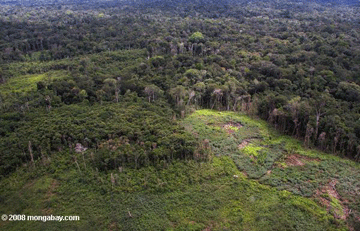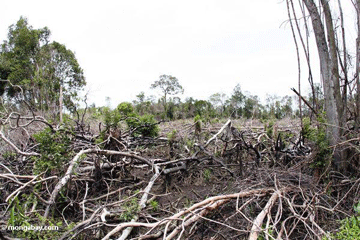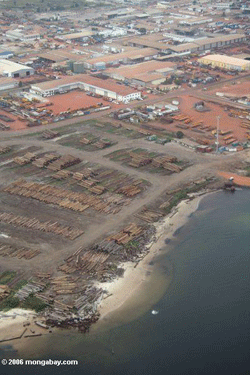Shift from poverty-driven to industry-driven deforestation may help conservation
Shift from poverty-driven to industry-driven deforestation may help conservation
mongabay.com
August 6, 2008
|
|
A shift from poverty-driven deforestation to industry-driven deforestation in the tropics may offer new opportunities for forest conservation, argues a new paper published in the journal Trends in Ecology & Evolution.
Citing research showing a transition in the forces driving tropical forest destruction, Rhett A, Butler of mongabay.com, a tropical forest web site, and William F. Laurance of the Smithsonian Tropical Research Institute in Panama suggest that the “industrialization” of deforestation provides environmental lobby groups with identifiable targets that may be more responsive to pressure on environmental concerns than tens of millions of impoverished rural farmers.
“Rather than being dominated by rural farmers, tropical deforestation now is substantially driven by major industries—especially large-scale farming, mining, and logging,” Laurance said. “Although this trend is pretty scary, it’s also much easier to target a handful of globalized corporations than many millions of poor farmers living on the frontier.”
Deforestation goes corporate
Globally the U.N. estimates some 13 million hectares of forest are cleared each year, a figure only slightly changed from recent decades. But these numbers mask a transition from government- and subsistence-driven deforestation to corporate-driven forest destruction.

|
From the 1960s through the 1980s, a large proportion of deforestation was the result of government policies promoting rural development, including agricultural loans and road construction. These initiatives, particularly in Brazil and Indonesia, drove large-scale deforestation by small landholders. Today, economic stability, an increasingly global financial market, and a worldwide commodity boom are conspiring to create a ripe environment for development by the private sector. While centrally planned development projects and poverty alleviation programs were once the engines of road construction and colonization schemes, the political impetus today for large infrastructure projects comes from industry interests seeking to facilitate access to international markets. Surging demand for grain, driven by the thirst for biofuels and rising standards of living in developing countries, are fueling the trend.
Although this trend is often seen as alarming, Butler and Laurance say there may be unexpected benefits for conservation initiatives.
“We argue that the recent shift from poverty-driven deforestation to industry-driven deforestation may offer new opportunities for rainforest conservation in that it is easier for pressure groups to target corporations and enterprises rather than tens of millions of poor farmers who are simply trying to put food on the table for their families,” Butler said. “While it may seem evident that activist groups are effectively using boycotts and ‘public shaming’ campaigns, we believe this paper identifies why this strategy is likely to continue to be effective relative to past approaches. We are already seeing industry respond with initiatives like the Roundtable on Sustainable Palm Oil, the Amazon soy moratorium, and moves by the timber industry in the state of Para.”

|
“Several financial firms, including Goldman Sachs, JP Morgan Chase, Citigroup Inc. and Bank of America Corp, have made concessions on their lending and funding practices relating to forest destruction following campaigns from environmentalists,” he continued. “Meanwhile some of the world’s largest commodity producers, including Cargill, the Maggi Group, Archer Daniels Midland, and Bunge, have agreed to stop processing soybeans grown on rainforest lands deforested since 2006. So far the ban is showing positive results.”
“Environmental groups are using carrots as well as sticks,” Laurance added. “Many multinational corporations are developing greener products because they’re more profitable. For example, the market for eco-friendly timber products is expected to be worth tens of billions of dollars in the U.S. by 2010.”
Challenges ahead
However, Butler and Laurance warn that in some markets—notably India and China—there is less consumer preference for environmentally-friendly goods. Further, “greenwashing,” or the misrepresentation of the environmental qualities of a product, also presents challenges for efforts to meaningfully reduce industry’s impact on the planet. Finally, industrial activities can in some cases create a strong economic impetus for infrastructure that further promotes forest clearing.
“Roads and transportation projects are still a crucial proximate cause of deforestation in many regions,” Laurance explained. “Many industrial activities (e.g., logging, mining, oil/gas development) promote deforestation indirectly by providing an economic incentive for road building. So, there is an interaction between deforestation being promoted by industrial/global drivers and deforestation by small-scale farmers and colonists. One facilitates the other.”
Nevertheless, Butler and Laurance are cautiously optimistic that emerging markets for the services provided by healthy forest ecosystems—including carbon storage, flood protection, and maintenance of biodiversity and rainfall—may offer new incentives for traditional forest destroyers to embrace forests as valuable assets.
“If ecosystem services markets can make conservation of natural forests a profitable endeavor for enterprise, the opportunity cost of deforestation will increase dramatically,” said Butler. “The net result could be enterprise-driven preservation of wild lands. Of course, the key to the success of this effort is ensuring that rural populations and forest dwellers share in the proceeds. Without their partnership, deforestation is not going to go away.”
PDF version of the paper
Other versions of the paper: Spanish | Portuguese | Indonesian | German | Indonesian | Malay | French | Farsi

